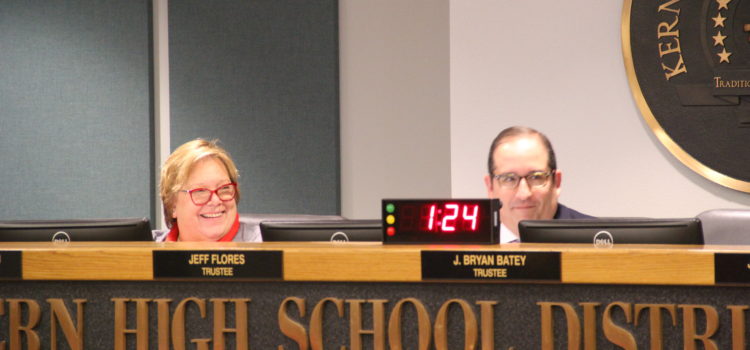
The Kern High School District unanimously adopted its Local Control and Accountability Plan Monday night, after hearing for months suggestions from community members.
Some of the biggest requests for the LCAP — a plan that outlines the goals, actions, services, and expenditures to support positive student outcomes that address state and local priorities — from the community were related to racial inequities within the district. The district has been criticized in the past for expelling Black and Latino students at higher rates than their peers and for lacking diversity among the district’s teaching staff.
“We have come a long, long way in a great, great way from six years ago,” said board member Jeff Flores at Monday’s meeting when talking about the topic. “This was a very tumultuous new thing. We are listening to stakeholders, staff is listening and incorporating, good job.”
The district’s goal was to increase the number of Hispanic and African American teachers by 2 percent; however it did not reach the goal.
The percentage of white teachers increased by 7.1 percent. Nearly 67 percent of the student body is Hispanic students, and only 25.4 percent of its teaching staff is Hispanic. The district’s percentage of African American teachers went up by 1.8 percent.
To address the issue, KHSD plans to launch a new teacher residency program with CSUB this year to increase the number of teachers of color. It also plans to do outreach to Historically Black Colleges and Universities, and it plans to continue recruiting in areas of the country that have a diverse workforce.
The LCAP that was adopted Monday will provide $70.4 million in the Kern High School District’s $524.9 million budget set aside for the 2019-20. That money is earmarked to provide funding for 70.8 percent of students in KHSD: 6.6 percent are English learners, 0.7 percent are foster youth and 70.8 percent are socioeconomically disadvantaged.
A settlement agreement in 2017 required the district to change its disciplinary procedures, from implementing Positive Behavior Interventions and Support (PBIS) to the way disciplinary hearings are conducted.
The LCAP report specifically names PBIS as a reason for some improvements in the district: Chronic absenteeism has decreased from 25 percent in 2013 to 14 percent in 2018. Seven schools had zero expulsions, and seven others had an expulsion rate of 0.1 percent.
But the report shows there’s still work to do in the realm of discipline. The district had a goal of reducing suspensions among African American males with special needs. In 2016-17, 30 percent of African Merican males were suspended, and those numbers jumped the next year to 32.7 percent. The California School Dashboard also notes that in 2018, 31.8 percent of foster youth and 16.9 percent of students with disabilities were suspended and those numbers increased over last year.
The LCAP report notes that its performance in math is particularly low, with all students 96.4 points below the standard.
Much of this year’s LCAP will continue the work of previous years. There is a big emphasis on class size reduction in core classes. The district’s career and technical education programs will receive an increase in funding. Mentoring and leadership programs will continue receiving funds, such Latina Leaders or Youth 2 Leaders, which serves foster youth students.
Extra money was allocated for new buses to improve attendance and access to school activities, and an additional six social workers would be brought on and another three school nurses.
At an earlier board meeting on June 3, students showed up during the public comment period to voice their opinions, many of them from the Youth for Justice and the Dolores Huerta Foundation.
Students complained about the lack of funding to put on Hispanic Heritage and Black History month events on campus. Celebrating these months are outlined in the district’s settlement agreement with the groups that sued over suspensions and expulsions — though nothing in this LCAP report mentions them.
A few students spoke in support of bringing ethnic studies to high schools as a way of helping students understand themselves — and each others’ backgrounds.
“We want to create an environment where everyone belongs and a school district where everyone learns about their history and roots,” Aaron Robles, a student with Youth for Justice told the board at the June 3 meeting.
Many of the students and even one parent asked for more health and mental health services to be available.
The group suggested STI testing be made available on campus as a way to bring down Kern County’s high rates. Students also said there was a need for more psychologists and even healing circles on campus that would allow peers to help each other through tough times.